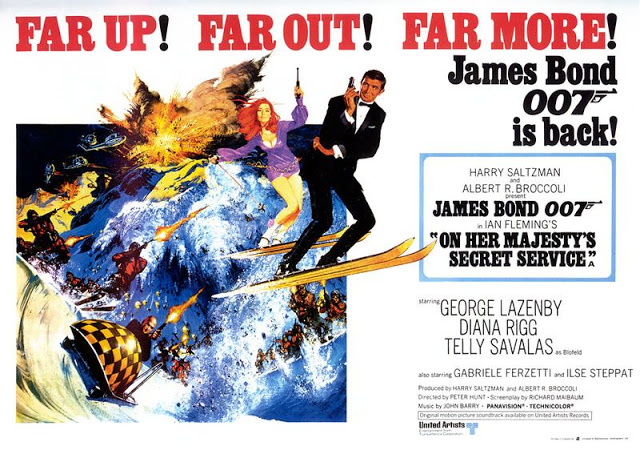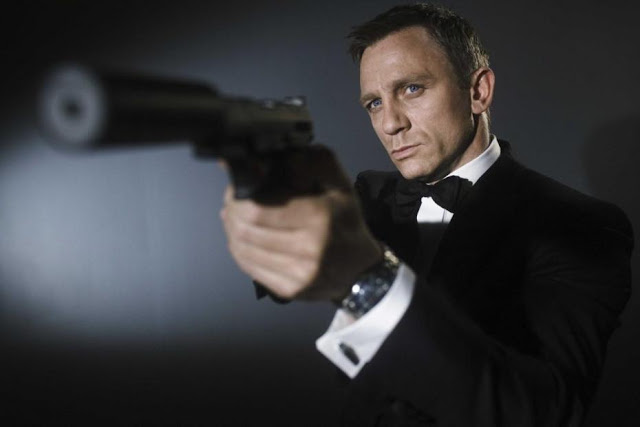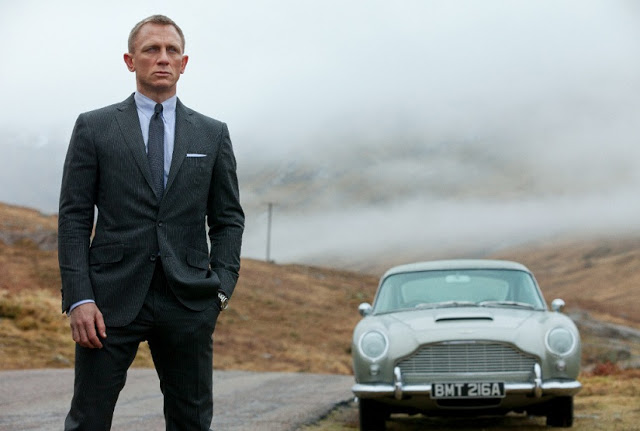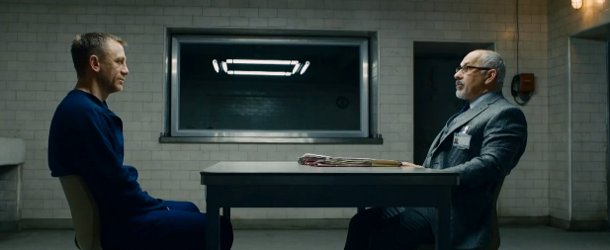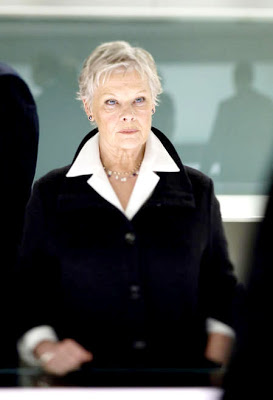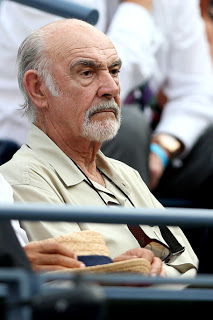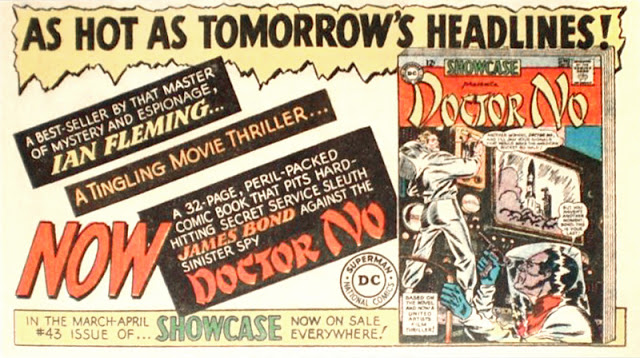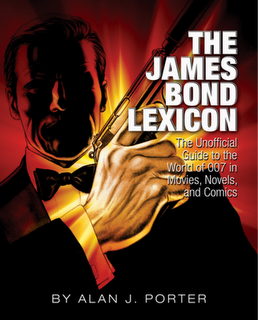 |
| Interview by Brian Saner Lamken |
Alan J. Porter was born in Greater Manchester, England, and grew up in the UK but moved to the States in 1996. He currently lives in Texas, where in addition to working as the Content Marketing Manager for Caterpillar Inc. he writes comics (including Disney/Pixar’s Cars), prose fiction (including an upcoming novella about H. Rider Haggard’s Allan Quatermain), and non-fiction (including Star Trek: A Comics History and James Bond: The History of the Illustrated 007).
I first “met” Alan almost 20 years ago via the Comics/Animation Forum on CompuServe. When my Skyfall review got me thinking anew about the world of Bond, it only made sense to pick the brain of the man cataloging Bond continuity and chronology in The James Bond Lexicon: The Unofficial Guide to the World of 007 in Movies, Novels, and Comics.
Our freewheeling E-mail conversation, held over the course of a week or so, follows.
How and when were you introduced to James Bond?
My introduction to James Bond was a little different than most people’s. It wasn’t through the movies, or even the novels, but through a board game.
The year was 1966. My friend Geoff had been given the Thunderball board game for his birthday. We played it incessantly — every chance we got, after school, on weekends. The thing is no-one in our circle of friends really knew who James Bond was; sure, the name was familiar in our 7-year-old world, but in the same way that names heard on TV or seen in the newspapers [were]. This game with its plastic frogmen and the cool-looking hero figure seemed to hint at even greater adventure.
I guess my conversation at home must have been littered with mentions of Bond, for that Christmas morning among my presents there was a Corgi model Aston Martin DB5, complete with ejector seat, and a James Bond annual. [Note: Annuals in Great Britain are large, hardcover collections of comics and other material.] The stories, articles, and above all photographs in the annual added whole new layers to the fascinating world of this secret agent. I was determined to find out more. But with the fickleness of youth, my resolve lasted less than a few weeks before something else caught my attention — most likely the arrival of American comics in my local newsagents.
A few years later I entered a competition in the local newspaper, and for the the first (and so far only) time in my life I won. [The prize was] free tickets to the local cinema to see On Her Majesty’s Secret Service, my first exposure to the cinematic Bond.
But who was this guy playing 007? It wasn’t the same one from the photographs in that well-thumbed annual, which still sat on the bookcase in my bedroom.
In the end it didn’t really matter. The car chases, explosions, and bad guy being eaten by the snow plow — this was high adventure, better than anything my young mind had dreamed up. From that point on I was hooked.
And On Her Majesty’s Secret Service still ranks as my favorite Bond movie.
I thought that 2006’s Casino Royale was outstanding — Daniel Craig made an excellent James Bond and the movie he was in was a high-quality, refreshingly grounded “reboot” of the franchise. Even though 2008’s Quantum of Solace disappointed, I was very much looking forward to Skyfall. Yet while my overall reaction to it was positive — and I clearly was not alone, judging from its global box office — I couldn’t help comparing the opening sequence to the action in the recent Jason Bourne movies. Do you think that successful, often newer rival franchises like the Bourne series has colored or co-opted the excitement of Bond to an extent?
Definitely.
The Bourne franchise succeeded where the Timothy Dalton [films] failed in trying to make a tougher, grittier spy for the present-day audience.
In taking things back to basics and back to the source — Ian Fleming’s novel — Casino Royale put things back on track. Skyfall was a good recovery after the misstep of Quantum of Solace, and I’m interested to see where they take things after the “classic Bond reintroduction” set-up at the end of Skyfall.
Originally the Bond movies were the class of the super-spy genre. They led and others imitated or followed, some seriously and some as spoofs. At some point during the Roger Moore run this switched and Bond started to follow trends rather than set them. For me personally, Moonraker is the epitome of this: It’s a movie where the franchise out-spoofed itself and hit an all-time low.
The success of Austin Powers played off this beautifully and also exposed the underlying absurdity of the Bond movie formula — and even the most die-hard Bond fan has to admit that there is one — to a wide audience, robbing the franchise of any pretension of being taken seriously.
Well, Moonraker was my own first experience with 007. To an 8-year-old boy in the summer of 1979 it was the height of cool, so for me the “original” James Bond = winky Roger Moore with a wrist-mounted dart gun.
[Moonraker was] a “first cinema Bond” for a lot of people I know, so I can understand why it’s among their favorites. It does seem to be one of the most polarizing movies in the canon. It’s a “love it or hate it” movie — I just happen to fall into the second category. Sorry. I can understand its appeal — especially if it was your first exposure to Bond.
You don’t have to apologize. Neither do I. That’s the great thing about nostalgia/childhood — it’s just about the only excuse for loving highly questionable material. For sure it’s the only way I can accept not finding the Star Wars prequels an abomination or thinking Cable of X-Force is awesome. My GI Joe was 8″ and had “kung-fu grip”; friends 10 years younger hoarded their little 4″ Cobra-fighting Joes instead. That’s the way it goes.
I guess that’s the same emotional tie that keeps On Her Majesty’s Secret Service top of my list.
For me the Bond movies always work best when they stay close to the original Fleming stories. Three out of my personal top four Bond movies are the ones that stuck closest to the books: From Russia with Love, On Her Majesty’s Secret Service, and Casino Royale. My favorite Moore-era Bond, For Your Eyes Only, sticks closely to Fleming in combining two of his short stories to furnish the plot.
The non-Fleming-sourced Bond that appears in my top four? GoldenEye.
Quantum of Solace was a surprise to me in terms of how much of a sequel it was, plot-wise, to Royale, instead of just being the next Craig-as-Bond film. Although Skyfall doesn’t follow Solace as much as Solace did Royale, it definitely seems to conclude a trilogy that gives us an extended “origin” of James Bond. Do you know how early on such continuity and story progression was planned?
This is supposition and rumor, but my understanding is that the sequel thing was something of an afterthought when Casino Royale hit big and then, given the prevailing Hollywood trend of sequels (something Bond has never needed), it was hastily added as a plot element. It doesn’t work.
Quantum is an insipid plot anyway, and adding the Royale follow-up subplot did nothing to save it. In fact, I think it confused the casual audience even more. Each Bond film pretty much stands on its own; there is no real continuity between them.
If you try to examine the series from a continuity perspective — something I am doing for my James Bond Lexicon project — it can make your head hurt. [There are] so many contractions and implausible timelines. I speak from months of experience.
Skyfall in particular opens a can of worms around that question, especially with the inclusion of the Aston Martin. What is clear is that Skyfall is set many years after Quantum and that this is an older, worn-out Bond. I see Skyfall and Casino bookending a significant chunk of Bond’s career — you could say that the other stories all took place in-between them. The ending of Skyfall is a clear indication of the passing of one era and the start of another — and, as I said above, it’s interesting that this new start seems to point back to a more classic Bond. We shall see.
Honestly, I’d long held the view that James Bond was essentially a title that the 007 designation carried — notwithstanding evidence to the contrary in On Her Majesty’s Secret Service and the fact that the series generally tries to have it both ways, giving us a little meta nod on occasion but never coming out and saying so.
I think you’ve made the right observation with the idea that the movie series tries to have it both ways, Bond as his given name and Bond as a code name.
The whole “Bond can be replaced” thing was first played out in the movies with the switch from Sean Connery to George Lazenby in the pre-credit sequence of On Her Majesty’s Secret Service when Lazenby breaks the fourth wall, looks straight into the camera, and says “This never happened to the other fella.”
Of course the movie then has a whole sequence later on trying to show that this is the same Bond after all.
The idea that Bond is just a code name is one way of explaining the changing faces. Either that or the Time Lord theory — but we won’t go down that rabbit hole. The spoof Casino Royale movie from the late ’60s also played with the code-name idea in that the original Bond, played by David Niven, is now retired, and his name has been handed down to a replacement. Later on every agent is given the James Bond 007 code name in an attempt to confuse the enemy and it all gets rather silly — or sillier.
In the Craig reboot they also hinted at that when in Quantum of Solace Bond’s friend, Mathis, reveals that his name isn’t really René Mathis, making you wonder if Bond is not really Bond — but then Skyfall seems to put that theory to rest with the scenes at Skyfall lodge itself.
As I said, there is no real continuity to the movie Bond. It varies based on the writer/director combination on any given movie along with the notes they get at the time from Eon Productions. I’d love to see the writer’s bible for doing a Bond script one day.
It’s pretty much the same in the novels: Fleming’s original Bond, John Gardner’s 1980s Bond, and Raymond Benson’s 1990s Bond are all very different characters — while in the most recent novel, Carte Blanche by Jeffrey Deaver, we got a completely reinvented Bond for the 21st century.
What’s so weird about locking in Bond as Bond with the obituary M writes and the visit to Skyfall, etc., is that right in the same movie hay is made over Raoul Silva, operative-turned-adversary, having been given that name when he became an MI6 operative. It was all right there. I suppose that once Skyfall became a plot element, however, the filmmakers had to establish definitively either that James Bond was not truly James Bond or that he was, and that the code-name option wasn’t one they wanted to commit to.
Yep. The “Silva isn’t my real name” angle, not really necessary from a plot point-of-view, muddied the waters further by making it seem as if being given a new name is standard operating procedure when recruited by MI6.
Skyfall had much bigger plot holes that needed fixing than playing around with the code-name concept, though. I know the plot holes marred the movie for a lot of people, including my wife — but as I mentioned to her, they were plot holes [the filmmakers] drove the Aston Martin through, and judging by the cheers in the audience when that appeared on screen it forgave a lot.
It’s not your job, since you’re not affiliated with Eon, but if you have an explanation for why mention of Skyfall during Bond’s psych evaluation sets him off I’m all ears.
No idea. It worked great as a teaser in the trailers, but in the movie itself it just felt forced. The name on the stone pillar at the lodge entrance worked just as well in revealing why the movie was called Skyfall. It was a very clumsy piece of foreshadowing and wasn’t needed.
The 2006 Casino Royale reboot — inasmuch as that word means anything for a series that basically shifts its continuity with every recasting of its lead if not every single film — would be a fine place to break with the past, launching a new era for at least as long as Daniel Craig’s tenure lasts. And in a way, as we’ve both noted, it did, bringing us back to the old status quo after a fashion at the end of Skyfall. Except that Judi Dench was held over as M from the Pierce Brosnan films, tying Craig’s run to the past. Moreover, that Aston Martin shows up in storage, which as you say seems to place pre-Craig Bond movies, or “Earth-Craig” versions thereof anyway, between Quantum and Skyfall — but not only would Dench’s M have been the M in all of those, Moneypenny would’ve been absent from all of them and quite possibly Q too; I’m a little fuzzy on whether this was supposed to be Bond’s first meeting with a Quartermaster or just this one.
As much as I love Judy Dench in the role of M, I think the worst thing they did with the Casino Royale reboot was have her continue in that role. It just added to the confusion. Although based on dialogue about backstory, [Craig’s] M is a different person that Brosnan’s M. It would’ve been better to make a complete break. I’ve never understood why they made this one exception to doing a total recast — other than that Dench was brilliant in the role.
In the scene with the new Q in Skyfall, the quip about expecting a poison pen was a hint that Bond had worked with other Quartermasters before but that this was a new, young Q with a different way of doing things. A thought I had is that maybe the old Q was one of the people killed in the explosion at MI6 headquarters. Did you notice that the CNN broadcast that Bond watches says six people were killed, but you see M looking at a row of eight coffins? Who were the other two?
I did not. Getting back to the snake eating its own tail, I’ll say this: I’m sure that Eon has other plans, and realistically Craig won’t be around for more than a few more films, but I wouldn’t mind seeing past films remade — or, really, the novels on which they were based adapted anew — with Craig’s Bond and the new paradigm we’re given at the end of Skyfall.
I believe that Craig is contracted for two more movies after Skyfall.
I’ve always wanted to see a faithful adaptation of The Man with the Golden Gun. In fact, I think that Robert Davi — who played the bad guy, Sanchez, in Licence to Kill — would have been a perfect Scaramanga. But I doubt we will ever see other versions or remakes, as the rights issues could get complicated. I know that at one point Eon only had rights to some titles [of Fleming’s novels and short stories] but not plot elements. For instance, Fleming would only license the title to The Spy Who Loved Me.
Were you surprised that Skyfall delved into Bond’s past, involving his childhood home and bringing in a character, Kincade, who knew him before he worked for MI6? Did you hear anything about the producers reaching out to Sean Connery to play Kincade during pre-production (a rumor that that I’m glad I didn’t come across until after seeing the film, and which I suspect wasn’t all that likely for a number of reasons)? Had Moneypenny’s introduction been spoiled for you?
There is a rumor that Kincade was written to be a cameo for Connery in Skyfall, but I don’t know if they ever actually approached him about it.
I was glad that they added more to Bond as a person in this one. Bond has always been more of a plot element than a character, in both the early books and most of the movies, so I’ve always enjoyed the few glimpses we get of the man behind the number. I’m a sucker for backstories anyway; I love to write them.
I’ll admit I was amazed that I hadn’t heard anything about the Moneypenny reveal before I saw it. The producers and PR people did a great job of keeping the lid on that one, and so did the press — a difficult thing to do in the current social-media-driven culture.
I confess to having read maybe one of the Gardner books and even that’s a fuzzy memory. If I’m not mistaken, though, the movies continued on an entirely separate trajectory after running out of actual Ian Fleming stories to adapt — however loosely, depending on the film. Is there a reason that post-Fleming novels haven’t been used as the basis for any of the Bond movies?
It’s basically because Bond is owned by two separate entities, and no matter what we fans would like to think they are essentially two completely different properties. The prose Bond is owned by the Fleming estate through IFP (Ian Fleming Publications) while the movie Bond is owned by Eon Productions — and the two don’t mix, which is why you’ll probably never see a filmed adaptation of one of the continuation novels. Although didn’t someone once say “never say never”…?
I know that back when IFP were authorizing new Bond comics stories the writers and artists weren’t allowed to include elements that had been introduced in the Bond movies.
And it’s what makes doing a project like The James Bond Lexicon as an authorized project almost impossible.
Exactly what is The James Bond Lexicon — an 007 encyclopedia or an in-universe dossier or some hybrid of both? I’d thought it was “just” an A-to-Z reference (no small feat), but now I’m conjuring up a cross between Michael Fleisher’s The Great Superman Book and Phillip José Farmer’s Doc Savage: His Apocalyptic Life. Does the book attempt to reconcile the novels with the films as well as the films with one another? To what extent are the entities that now control/license Bond involved?
The James Bond Lexicon is subtitled The Unofficial Guide to the World of 007 in Movies, Novels, and Comics, so that sort-of answers both questions. Conceptually it’s an A-to-Z reference of, hopefully, all English-language Bond adventures — live-action, prose, and comics. So closer to the Fleisher books, I guess.
But I will be including some essays on various aspects of Bond, including my thoughts around continuity and how to reconcile the various Bonds. One of the hardest parts of the work has been deciding when to split entries and create a new one for a character who is ostensibly the same person. With the movie Bond I was happy having the Connery/Lazenby/Moore/Dalton/Brosnan version be considered the same person, with Craig’s reboot an entirely new take, but after Skyfall I started to think about the “it all fits between Casino Royale and Skyfall” theory to explain the appearance of the tricked-out Aston Martin. And then my previous theory falls apart.
I must say that Skyfall being as enjoyable as it was, despite its problems, and rekindling such continuity-minded questions has the mythology geek in me curious about comics adaptations and the like — of which I’ve read very few: the Dr. No issue of DC’s Showcase, once upon a time; Mike Grell’s Eclipse miniseries when it came out; a few excerpts glimpsed over the years. I know that Bond has a long legacy in newspaper strips in the UK. Have any of the strips been compiled in formats that you’d recommend?
There have in fact been more original Bond stories told in comics format than any other format — and the longest-tenured Bond writer was Jim Lawrence, the main writer of the Bond newspaper strip, who wrote thirty-three Bond stories compared to Fleming’s twenty.
I hope The James Bond Lexicon will introduce the Bond of the comics to the movie and novel fans, as it will include entries on stories from all the newspaper-strip adventures plus other English-language comics (such as the Mike Grell miniseries you mentioned).
Titan Books collected all the newspaper strips in a 17-volume, large-format series of books published between 2005 and 2008 — I wrote a few introductory essays for the later volumes. These are currently being reissued at a small size, with several volumes bound together, as the James Bond Omnibus series.
the book, to be published next year by Hasslein Books. More of Alan J.
Porter online: Twitter, website, Facebook fan page.
Brian Saner Lamken, former and perhaps future editor of Comicology, blogs on pop culture at Blam’s Blog.


































































































